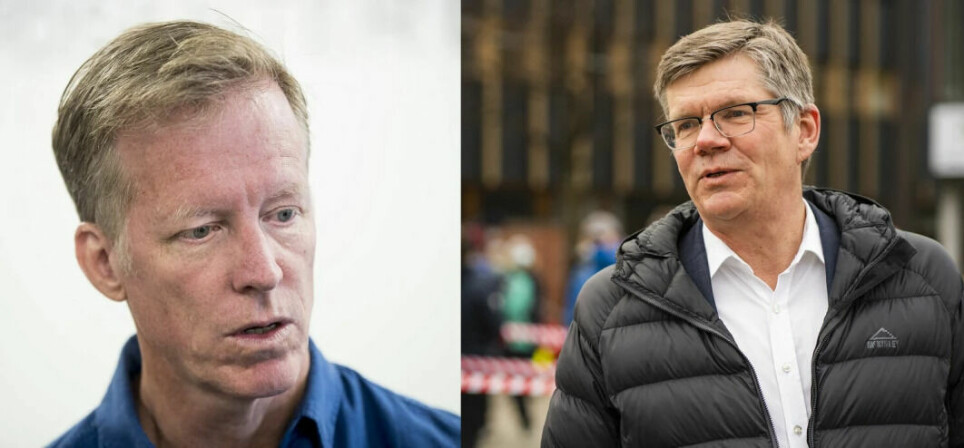
Minister forces resignation of the board of the Research Council of Norway. “This is about whether ten-year-olds with cancer diagnoses should live or die” says rector
“What do you really want from your universities?” asks Curt Rice.
“Hard to understand this as anything but a complete disaster for the people of Norway,” Curt Rice writes on Twitter after Minister of Research and Higher Education Ola Borten Moe on Thursday forced the entire board of the Research Council of Norway to resign.
Rice is the rector of the Norwegian University of Life Sciences (NMBU).
The decision to remove the board sent shock waves through Norwegian academia, with rectors, researchers and politicians expressing their dismay - as well as questioning the reason behind the drastic measure.
“If Norway is to succeed with what is in ‘Hurdalsplattformen’ (the government platform for Jonas Gahr Støre’s government consisting of the Labour Party and the Centre Party) we must fund much more research, not less,” Rice tells sciencenorway.no.
“It will require investments, and not just a little,” he continues.
“If, by this, the minister thinks that less money should be allocated to research, there will be a real crisis. We will struggle to recruit the best,” says Rice.
Hard to understand this as anything but a complete disaster for the people of Norway. https://t.co/XtBHE3UKI6
— Curt Rice (@curtrice) May 12, 2022
“Right and necessary”
Former Minister of both Finance and Education, Kristin Halvorsen, will be the new chair of the board for the Research Council, according to Aftenposten (link in Norwegian), who first broke the news. The new board will sit throughout 2022, writes Khrono (link in Norwegian).
“It is right and necessary to do this,” Minister Ola Borten Moe says to Aftenposten.
According to new figures from the Ministry of Education and Research, the Research Council will have a loss of 275 million NOK this year, 1.9 billion NOK in 2023 and 2.9 billion NOK in 2024, writes Aftenposten.
“It is a situation we obviously cannot end up in. This is what we must avoid,” says Borten Moe.
The board: fully behind the Research Council’s financial management
In a joint statement to Aftenposten (link in Norwegian), the outgoing board rejects the minister's portrayal. The board writes that they have followed the instructions of the department.
"We register that there is now a change of course in this area. (...) The board is fully behind the Research Council's financial management, and believes it is good and justifiable. This is also confirmed by the Office of the Auditor General's latest audit without any comments, from April 2022," they continue.
Ola Borten Moe also reports that fewer research projects will be allocated funding for research. This concerns Svein Stølen, rector at the University of Oslo.
“We need a strong Research Council. It is about international competitiveness, and raising money from Horizon Europe,” he tells sciencenorway.no.
“This affects basic research. This is about a ten-year-old with a cancer diagnosis who will either live or die. It's about innovation and new business ventures,” says Stølen.
“What do you want from your universities, Borten Moe?”
NMBU is the institution that receives the most funding from the Research Council per researcher.
“We are completely dependent on the funds to deliver research on sustainability and solutions for the environment. If funding is cut, we will be unable to meet the goals set by the government,” Curt Rice says.
“As rector, I would like to ask the minister: What do you want from your universities?”
Rice says that the recent years with a pandemic have shown that science is the key to solving society's most important challenges.
“I despair if the main message is that we will fund less research than what is planned,” he says.
“This concerns the science and knowledge Norway will need to create a future”
“What consequences do you fear this will have for research at the University of Oslo?”
“This can hit us hard. We are very dependent on competitive arenas, first and foremost to maintain high quality research. It will affect strong, world-leading research groups,” says University of Oslo rector Svein Stølen.
At the same time, Stølen believes it is wrong to think that this is about universities or research.
“It's about the science and knowledge Norway will need to create a future, and it's about which society we should live in and what the focus should be. It's not about the research sector,” he emphasises.
The prime minister must answer
“At a time when the world is investing in research, it is strange that the focus of Prime Minister Jonas Gahr Støre is to cut funding. This is one of several measures. The Labour Party and Jonas Gahr Støre say they want to reform and increase levels of trust within the public sector. I would have liked to see the prime minister offer more information about the overall thought process behind this decision,” Stølen says.
He is concerned about what consequences not only the forced resignation, but also the government's overall politics on science and research, may have for basic research - and thus people.
“Prime Minister Jonas Gahr Støre has to explain his politics on science and research, his politics on knowledge. It is very unclear. This is a very strange move from a government,” Stølen says.
“We have a good impression of the board”
Stølen is curious about the decision.
“This came unannounced. This is a board that only has a few months left in its term of office,” he says. “We have a good impression of the board, and this is critical for many of our international research groups.”
He points to the Office of the Auditor General's assessment from April this year. No objectionable conditions were found in the Research Council's financial management.
Curt Rice is critical of the priorities of Minister Ola Borten Moe in this case.
“I respect the need for good management. I just don’t hear an explanation of his vision for research and the further development of our society. The result is that we do not understand the context.”
---
Read the Norwegian version of this article on forskning.no
































